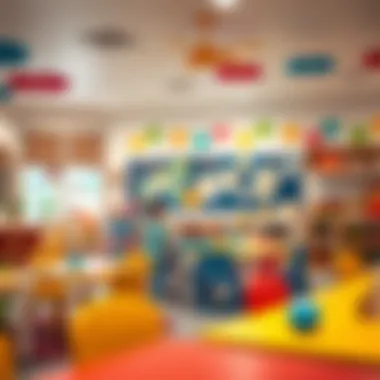Exploring Nurseries in Khalifa City A for Early Education


Intro
Khalifa City A, a bustling suburb in Abu Dhabi, plays an essential role in the real estate market and urban development of the region. As families flock to this area for its modern facilities and well-planned communities, the demand for quality education, specifically in early childhood, has surged. This necessity has given rise to a variety of nurseries catering to diverse needs. Understanding what these nurseries offer is crucial for any parent or guardian looking to lay a strong foundation for their child's educational journey.
In this guide, we will navigate through these institutions in Khalifa City A, exploring their different educational philosophies, how local culture influences child development, and tips parents should consider while making their choice. Our goal is to provide a well-rounded perspective that not only highlights crucial information but also equips families with the knowledge needed to make informed decisions about their children's early education. Parents new to the area will find this especially helpful, as the educational landscape can often feel overwhelming.
Let’s embark on this journey to uncover what makes the nurseries in Khalifa City A special, and how they fit into the larger tapestry of family life in this vibrant city.
Understanding the Nursery Landscape
The very fabric of early childhood education forms a critical foundation for a child's future. In Khalifa City A, where families frequently seek a nurturing environment, understanding the nursery landscape is paramount. This area presents a spectrum of nursery options that cater to diverse educational philosophies and cultural backgrounds, making it essential to comprehend what each nursery offers. Knowing the nuances of early childhood education allows parents to align their values and expectations with the most suitable facilities for their children.
Defining Early Childhood Education
Early childhood education (ECE) isn’t merely about babysitting; it is a structured approach to nurturing a child’s development during their most formative years. To define ECE, one must recognize it encompasses various programs aimed at boosting a child’s physical, emotional, social, and cognitive growth before they enter formal schooling. The importance of these years cannot be overstated; studies indicate that experiences during this period significantly shape one's ability to learn, manage emotions, and develop social skills later in life.
- Holistic Development: ECE programs might integrate playful learning, social skillbuilding, and introduction to literacy and numeracy. This ensures that a child not only learns academic content but also how to interact with peers and engage in their environment.
- Diverse Methodologies: Different educational styles—such as play-based learning or structured curricula—are prevalent across nurseries. Parents can choose what aligns best with their philosophies and the needs of their children.
- Cultural Relevance: Understanding the local educational context also means considering how cultural norms shape what is taught. Each nursery might introduce aspects of the Emirati culture and traditions, making learning contextual and relatable for children.
The Role of Nurseries in Child Development
Nurseries act as pivotal spaces for children’s growth and development, extending far beyond mere supervision. They serve multiple roles in shaping young minds and fostering a sense of community among children. This role can be dissected into several key areas:
- Social Interaction: Early interactions with peers in a nursery setting enable children to learn sharing, cooperation, and negotiation. These social skills are often critical to navigating later school experiences and establishing friendships.
- Emotional Growth: Exposure to caring educators and structured play helps children regulate their emotions. They can express feelings, negotiate conflicts, and build resilience in a safe environment.
- Cognitive Development: Through structured activities and unstructured play, children engage in problem-solving and critical thinking from an early age. Nurseries often implement creative teaching techniques that stimulate curiosity and a love for learning.
"The first five years have so much to do with how the next 80 turn out." - Bill Gates
Types of Nurseries in Khalifa City A
When it comes to choosing a nursery for your child in Khalifa City A, understanding the different types available can make all the difference. Each nursery type influences not only the learning experience but also aligns with various educational philosophies and family needs. As Khalifa City A is rapidly growing, so too is the diversity of educational environments. Selecting the right fit will set the stage for your child's early development and future learning trajectory.
Traditional Nurseries
Traditional nurseries are perhaps the most common choice among parents. These establishments tend to follow a structured curriculum that emphasizes foundational skills, such as basic literacy and numeracy. In Khalifa City A, traditional nurseries resonate with families looking for stability and a conventional approach to early education.
Generally, these nurseries offer set schedules filled with organized activities. Children are guided through a program where they learn through play, fostering their social skills and basic cognitive abilities. The environment is typically stimulating but adheres closely to established educational standards.
- Key Features of Traditional Nurseries:
- Focus on structured learning and routines.
- Introduction to foundational subjects like math and language.
- Engaging activities that promote peer interaction.
Choosing a traditional nursery means opting for familiarity and reliability. Parents might find comfort in well-documented curriculums and a clear structure that maps out the child’s learning progress.
Montessori and Alternative Approaches
Montessori and alternative approaches offer a contrasting philosophy to traditional systems. These nurseries prioritize child-led learning in a more flexible environment. In Khalifa City A, several institutions align their practices with the principles established by Maria Montessori, emphasizing autonomy and the unique learning pace of each child.
In a Montessori setting, children are encouraged to choose their activities, fostering independence and critical thinking. The classrooms are designed to be inviting and engaging, filled with materials that encourage exploration. Children learn through hands-on experiences, engaging in everything from arts and crafts to practical life skills.
- Highlights of Montessori Nurseries:
- Individualized learning experiences and autonomy.
- Focus on practical skills and real-world scenarios.
- Collaboration over competition, fostering a supportive community.


This method may resonate well with parents who value creativity and wish to nurture their child’s innate curiosity, setting them on a path toward lifelong learning.
Bilingual and Language-Focused Nurseries
With Khalifa City A's diverse community, bilingual and language-focused nurseries are gaining popularity. Such establishments are designed to cultivate linguistic skills alongside general education. Parents looking to expose their children to multiple languages at an early age may find this option particularly attractive.
Typically, these nurseries immerse children in languages like English and Arabic, promoting fluency through a blend of structured lessons and playful interaction. This environment not only aids in language development but also promotes cultural awareness and sensitivity in an increasingly globalized world.
- Benefits of Bilingual Nurseries:
- Early language acquisition enhancing cognitive development.
- Strengthened cultural understanding and appreciation.
- Preparation for a globalized future, valuable in an expatriate context.
For parents considering this route, early exposure to multiple languages could prove advantageous as their children grow and navigate an interconnected world.
"The right nursery can ignite a lifelong passion for learning, setting children on a path filled with curiosity and engagement."
Criteria for Choosing a Nursery
Selecting the right nursery is a significant step for any parent. It isn’t just about finding a place that looks nice or is near your home. It’s about ensuring a nurturing environment that fosters your child's growth and development. Like looking for the perfect pair of shoes, you want a fit that suits both you and the little one. The criteria you choose to evaluate nurseries can have long-lasting impacts on your child’s educational journey and emotional well-being. Navigating through these choices can feel daunting, but understanding critical factors can ease the process.
Location and Accessibility
When it comes to finding a nursery, location is king, or rather, queen! You’ll want to pick a place that is easy to get to. A nursery that’s a stone’s throw from your home or workplace can make the day-to-day routine a lot smoother. Consider the traffic patterns. In a bustling area like Khalifa City A, getting stuck in traffic can make a quick drop-off feel like climbing Mount Everest. Accessibility isn’t just about how close it is, though. Think about the convenience of public transport and whether the nursery has ample parking. Also keep in mind that children thrive on a routine; easier access can contribute positively to their experience and your peace of mind.
Curriculum and Educational Philosophy
Not every nursery has the same approach to education. Some might lean toward a play-based curriculum, emphasizing hands-on activities and peer interaction, while others may follow a more structured method focusing on academics. Ask yourself, what philosophy best suits your child? Their learning style is just as important as the nursery's approach. A place like a Montessori nursery might appeal to parents seeking a child-centered philosophy, while a traditional nursery may be more suitable for those valuing foundational skills in reading and math. Knowing what resonates with your family allows you to filter your options.
Staff Qualifications and Ratios
The expertise of the staff cannot be overlooked. After all, these are the individuals who will be caring for and educating your little one. A qualified staff often means more than just a degree. Consider their experience and ongoing training. What does defined staff-to-child ratio look like? In Khalifa City A, smaller groups can foster personalized attention, allowing teachers to recognize and nurture individual needs. It’s often said that an enthusiastic teacher can ignite a love for learning, and this starts early. Visit potential nurseries to observe interactions; sometimes it’s about feeling the vibe in the room and assessing how comfortable both parents and children feel.
Facilities and Resources
The physical environment where your child spends their days is just as crucial as the people. A well-equipped nursery can make educational experiences richer and more engaging. Look beyond just toys—consider outdoor play areas and indoor spaces that inspire creativity and exploration. Do they have art supplies accessible for spontaneous creation, or are there books galore waiting to be discovered? A variety of resources can enhance learning and encourage children to explore their interests. Safety is paramount, too, so check for clean, safe, and well-maintained facilities.
"The right nursery can set the tone for a child’s educational experience, shaping their approach to learning for years to come."
In summary, when choosing a nursery in Khalifa City A, keep these aspects in mind. The right balance of location, educational philosophy, staff quality, and facilities can create an environment where your child can flourish. Each family is unique, so take the time to find what resonates with yours. The investment in these early years can pay off in countless ways down the line.
Exploring the Benefits of Early Education
Early education plays a vital role in the development of young children, and in a place like Khalifa City A, this is especially relevant. The services offered by nurseries can dramatically shape a child’s formative years. It’s important to understand the multiple benefits that early education provides, not just for the individual child, but for families and communities as well. Children begin to absorb information at a staggering rate, making this age crucial for setting the foundation of their lifelong learning journeys.
Socialization and Peer Interaction
Young children are naturally inclined to explore their surroundings and associate with peers. Nurseries offer structured environments where they can engage with other kids, thus enhancing their social skills.
- Building Friendships: In a nursery setting, children learn to share, take turns, and resolve conflicts. They develop interpersonal skills that will serve them throughout their lives.
- Understanding Diversity: In Khalifa City A, with its blend of cultures, children are exposed to various traditions, enhancing their ability to appreciate differences and accept others.
- Emotional Intelligence: Social interaction in nurseries fosters emotional growth. Kids learn to express themselves and understand their feelings as well as those of their classmates.
Engaging in these social scenarios at an early age prepares children for future interactions in school and beyond. Parents often undervalue these early social experiences, yet they are pivotal in forging pathways for effective communication and building relationships in later stages of life.
Cognitive and Emotional Development


Early education is not just about numbers and letters; it encompasses the complete emotional and cognitive development of a child. Studies show that engaging with educational systems at a young age can enhance brain development significantly.
- Problem-Solving Skills: Children in nurseries often encounter various challenges that encourage them to think critically. They learn to approach problems creatively.
- Informed Decisions: Nurseries typically incorporate play-based learning, which builds decision-making abilities. This kind of environment allows children to experiment and explore without the fear of failure.
- Self-Regulation: As they interact with teachers and peers, children develop emotional regulation skills, learning to cope with frustration and manage their emotions positively.
To put it simply, a nurturing nursery environment is one where kids can not only discover academic subjects but also develop their identity and learn how to navigate their feelings. The interplay of cognitive and emotional learning ensures a balanced development process.
Preparation for Formal Schooling
When it comes to transitioning to formal schooling, early education serves as a crucial stepping stone. Here’s how nurseries in Khalifa City A prepare children for the school system:
- Foundation for Academics: By introducing basic concepts in math, reading, and writing, children enter primary school with confidence and readiness, significantly lowering their anxiety levels about new learning environments.
- Structured Learning Environment: Children get accustomed to following routines, such as classroom rules and schedules, which makes the transition to more structured learning easier.
- Enhancing Independence: Nurseries encourage children to make choices, fostering independence and boosting their self-esteem, which are essential traits for success in later schooling.
In essence, while parents might think preparation primarily consists of academic readiness, it equally encompasses emotional preparedness, peer interactions, and the reinforcement of self-worth. The seamless transition fostered by nurseries ensures that when it comes time for more formal education, children feel equipped and ready to tackle new challenges.
Investing in early education is not merely a choice but a strategic stepping stone preparing children for their academic futures.
Understanding the multifaceted benefits of early education can empower parents to make informed choices regarding their children’s nursery experience. As Khalifa City A continues to grow, the significance of these early developmental advantages becomes ever more apparent.
Navigating Parental Concerns
Selecting a nursery for a child in Khalifa City A presents several challenges for parents. As they take on this significant task, it’s crucial they understand the multifaceted concerns that can arise during this period. Every choice made during these formative years has far-reaching implications. Thus, this section examines key parental considerations as they ponder what nursery would best suit their child's needs, ensuring they can navigate this journey with greater ease and confidence.
Balancing Work and Family Life
In a bustling environment like Khalifa City A, parents often find themselves juggling various responsibilities. The balance between work commitments and family needs can tip into chaos if not handled with care. One of the primary factors when selecting a nursery is how it aligns with work schedules. This may include looking for nurseries that offer extended hours or flexible pickup times. The aim here is to ensure that while children are receiving quality education, parents aren’t left stressed out, rushing between work and nursery drop-offs.
Additionally, some nurseries may provide integrated solutions, like offering after-school programs or activities that keep children engaged while parents finish their jobs. By doing so, families can maintain harmony, ultimately creating a more supportive environment for children to thrive in.
Cultural Considerations and Adaptations
Khalifa City A is a melting pot of diverse cultures, and this diversity can deeply impact the way children engage with their nurseries. Parents often have strong cultural values they wish to nurture in their children. Therefore, it’s essential that chosen nurseries not only respect but celebrate these differences.
Many nurseries in the area have adopted culturally sensitive teaching approaches, integrating local customs and languages into their curriculums. This becomes a prime consideration for parents who want their children to remain connected to their heritage while also learning about the global world around them. Engaging with educators to understand how they approach multicultural education can help parents feel more at ease and can encourage better integration for their children.
Maintaining Communication with Educators
An open line of communication between parents and educators at nurseries is critical. Without proper dialogue, misunderstandings can easily arise, leaving parents feeling disconnected from their child’s educational journey. Establishing a strong connection with nursery staff not only builds trust but also provides a platform for sharing insights about a child's development.
Regular updates regarding a child’s progress, challenges, or milestones are essential. Many nurseries adopt various methods for keeping parents in the loop—weekly newsletters, parent-teacher meetings, or digital platforms where updates can be found at a glance. Finding a nursery that prioritizes these communication systems can alleviate anxiety and assure parents they are involved in their child's growth.
By delving into these concerns—balancing work-life dynamics, honoring cultural values, and fostering educator communication—parents can not only address their immediate needs but also lay a strong foundation for their children’s educational experiences in Khalifa City A.
"The right nursery sets the stage for a well-rounded education, tailored to the evolving needs of children in a diverse community."
Through thoughtful consideration of these aspects, parents can make informed choices that resonate with their family’s unique values and lifestyle.
The Impact of Local Culture on Nurseries
The significance of local culture cannot be overstated when it comes to nurseries in Khalifa City A. This part of Abu Dhabi is a melting pot of diverse traditions and values, making it essential for educational settings to reflect and respect these cultural nuances. Local culture fosters a supportive environment, encouraging children to develop an appreciation for their heritage while also respecting others. It's about creating a rich learning experience where cultural sensitivity is paramount.
Cultural Sensitivity in Education
Cultural sensitivity in education reflects an awareness and respect for the varied backgrounds of students. In Khalifa City A, where families come from various parts of the world, nurseries take on the challenge of integrating different cultural perspectives into their educational frameworks. This sensitivity goes beyond mere acknowledgment—it's about actively engaging children in conversations about their cultures and experiences.


For instance, a nursery in Khalifa City A may celebrate different cultural festivals, such as Diwali, Eid, or Christmas, allowing children to learn about traditions that are not necessarily their own. This inclusive approach not only enriches the children’s understanding but also fosters empathy and acceptance. Moreover, teachers trained in cultural sensitivity can adapt their teaching methods to meet the diverse needs of their students, paving the way for more personalized learning experiences.
Integration of Local Traditions and Values
Integrating local traditions and values within nursery curricula serves multiple purposes. It ensures that children understand and appreciate the cultural context of where they live, which is crucial for their social and emotional development. In Khalifa City A, this might involve incorporating elements from Emirati culture, such as storytelling from local folklore, crafts that employ traditional techniques, or even basic Arabic language lessons.
The benefits are twofold:
- Children gain a sense of belonging, knowing their heritage is acknowledged.
- They develop a broader worldview by learning about and respecting the traditions of others.
In a practical sense, nurseries may collaborate with local cultural centers or involve community members in a shared role within the educational experience. Thus, local traditions are not merely added features but core aspects of daily learning activities, creating an authentic and engaging educational environment.
"Cultural integration in early childhood education isn’t just about teaching—it’s about building bridges and nurturing a community spirit from a young age."
Through these culturally-sensitive approaches, nurseries are not only preparing children for formal schooling but also instilling essential values that will accompany them throughout their lives.
In short, the impact of local culture on nurseries in Khalifa City A shapes a vital learning atmosphere where children can thrive, both academically and socially.
Future Trends in Early Childhood Education
The landscape of early childhood education is not static; it’s a dynamic realm that continually adapts to the evolving needs of children and families. In Khalifa City A, these trends shape not just individual nursery experiences, but also the development of future educational practices. Understanding these trends is critical for families as they navigate the myriad options for their children’s formative years.
Technological Innovations
In a world where technology permeates every corner of our lives, it’s no surprise that early childhood education is melding with tech advancements. From tablet-based learning to interactive whiteboards, nurseries are leveraging tools that engage young minds in ways that were unimaginable a couple of decades ago. For instance, some nurseries deploy apps that allow parents to track their children’s daily activities and progress in real-time. This builds a bridge between home and school, providing parents insights into their child’s day and facilitating communication with educators.
Moreover, augmented reality (AR) and virtual reality (VR) are making waves in teaching methods. Picture this: a child is learning about dinosaurs—not just from a book, but by virtually stepping into a prehistoric world. This immersive experience can ignite curiosity and foster a love for learning that extends beyond the classroom. However, it’s crucial to balance screen time with traditional play, ensuring that technological tools enhance, rather than replace, the fundamental aspects of learning through play.
Evolving Educational Standards and Regulations
As education progresses, so do the standards and regulations that govern it. Khalifa City A is witnessing a shift towards more structured guidelines that emphasize outcomes in early childhood education. Regulatory bodies are focusing on not just academic readiness, but also on social and emotional development. This holistic approach to measurability signifies that nurseries must now create environments that promote wellbeing alongside cognitive growth.
It’s vital for parents to stay informed about these changes. Understanding the local regulations can aid in selecting a nursery that aligns with their values and expectations. Additionally, they should note that accredited nurseries typically adhere to higher standards, providing a more enriching experience for children.
"The future belongs to those who believe in the beauty of their dreams." — Eleanor Roosevelt
As these trends develop, they paint a promising picture for the future of early childhood education in Khalifa City A. Families that remain proactive and inquisitive can choose nurseries that not only cater to current educational practices but also prepare their children for a rapidly changing world. Keeping an eye on these trends ensures that children are not just prepared for school, but for life.
Culmination: Choosing the Right Nursery
Selecting an appropriate nursery for one's child can feel like navigating a labyrinthine maze. In this critical decision-making process, it’s all about alignment between what the nursery offers and what a family requires. Each child's needs are unique, and nurseries can vary significantly in their approach, curriculum, and environment. As a parent, you might end up thinking, “What fits my child best?” This article has outlined several elements you should factor into your decision-making process.
Weighing Factors Based on Family Needs
When considering a nursery, it’s essential to reflect on specific family needs. Here are some factors to contemplate:
- Proximity: The nursery's location can streamline morning routines. Is it near your workplace or home? How do commute times affect your schedule?
- Child’s Personality: Does your child thrive in social settings or prefer quieter, structured environments? Knowing this can guide you to a nursery that matches their temperament.
- Family Values: Every family has a set of values that can influence educational choices. What traditions are paramount for your family? Finding a nursery that reflects these can bolster your child's development.
- Budget Considerations: It’s important to assess your financial landscape. Not all great nurseries come with a hefty price tag, but understanding what services fit into your budget is critical.
By carefully reflecting on these aspects, families can make more informed choices regarding nurseries in Khalifa City A.
Empowering Decisions Through Research
Knowledge truly is power. The more informed you are, the better equipped you’ll be to make a choice that resonates with your family’s educational philosophy. Consider the following steps:
- Visit Potential Nurseries: First-hand experience can often reveal more than brochures and websites. Pay attention to interactions among children and staff.
- Ask for Recommendations: Networking with other parents can yield invaluable insights. Many have traversed this path and can offer personal stories about their experiences.
- Online Reviews: Websites dedicated to educational resources can provide reviews on various nurseries. Keep in mind that every child's experience can differ, but overall trends should inform your choices. You can visit sites like Reddit or Facebook groups that focus on parenting in your area.
- Educational Philosophy: Research the pedagogies of different nurseries. Knowing if a particular institution leans toward Montessori, Reggio Emilia, or a traditional model can clarify alignment with your child’s learning style.
Ultimately, knowledge is the cornerstone for making a decision that feels right for you and your child. Utilizing available resources can illuminate paths you might not have otherwise considered. The goal is not just to choose a nursery but rather to create a nurturing environment where your child can flourish and grow.
“Choosing the right nursery is choosing a foundation upon which your child's education and social skills will be built.”











